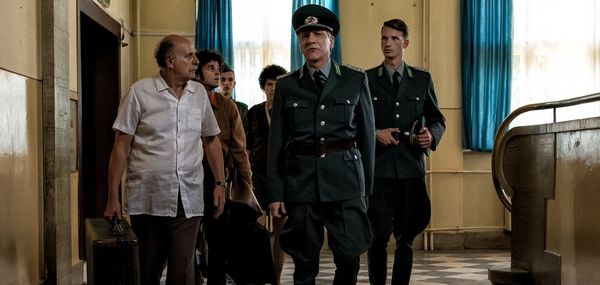Eye For Film >> Movies >> That Trip We Took With Dad (2016) Film Review
That Trip We Took With Dad
Reviewed by: Amber Wilkinson

Ideology comes abruptly up against complex reality in Anca Miruna Lazarescu's fiction feature debut that wraps its political message up in a warm and engaging family dramedy. Having cut her teeth on a succession of short films - both documentary and narrative - she steps purposefully up to feature length here, incorporating elements of her own dad's history into in a film that deserves every one of its 111 minutes.
Her focus is the Reinholtz family. An all-male clan since the death of the matriarch, they are German Swabians living in Romania at the political turning point of 1968. The elder son of the family Mihai (Alexandru Margineanu) is a doctor, trying to make the best of his Communist world, which is easier said than done considering his dad William (Ovidiu Schumacher) is an ageing firebrand and his younger brother Emil (Razvan Enciu), a wannabe revolutionary, who likes composing anti-Stalinist songs. "Very nice," Mihai tells him, "but don't ever play it again", a sentence that just about sums up the state of things in Romania. It's possible to do certain things in protest but definitely not advisable as neighbours are happy to inform on one another and falling foul of the party can result in shattered livelihoods.

Mihai's state of permanent stress - in stark contrast to his teenage brother's devil-may-care abandon - is further exacerbated by the fact that their dad needs an operation that can only be performed in Germany, leading him to compromise his principles in order to get them all on a road trip. As this trio of tough wills is packed into a yellow Skoda, Lazarescu mines the situation for humour but the warmth of the family is just a prelude for what is to come when they reach Czechoslovakia ... at the same time as the Soviet tanks of the Warsaw Pact Invasion.
Suddenly they find themselves with a lot more to worry about than the Securitate back home as all non-Czechs are rounded up - an incarceration that also allows Lazarescu to explore the way that old animosities can flare under stress. It's at this point that they meet beautiful - and privileged - German Ulrike (Susanne Bormann), who offers Mihai the tantaslising possibility of life and love in the West.
As the film progresses, it begins to flourish as Lazarescu opens up the themes beyond the familial to look at they idealistic way Ulrike and her friends view Communism. Mihai, who has been living it all his life, finds their notion of it as perfect hard to stomach. As the political conflict rages externally, Mihai is fighting his own personal battle over the notion of 'freedom' which is constrained not just by State but by family. Enciu is the standout, however, ageing from childhood to adulthood through the course of the film not just in look but through weight of experience a deft and difficult performances that will hopefully catch the eye of other casting directors.
Lazarescu displays a talent for moving between humour, drama and tragedy and an eye for framing a moment - whether it is the sight of the Skoda on the road with a tank or the boys getting there hands on more Western LPs than they ever dreamed possible. The period is recreated in detail and given a burnished glow by cinematographer Christian Stangassinger's warm cinematography. It may look and, even on family terms, feel nostalgic but Lazarescu makes sure we're aware of the tough choices facing her characters, who suddenly discover they can become masters of their own revolution - but that all decisions come with compromises and consequences.
Reviewed on: 30 Nov 2016














